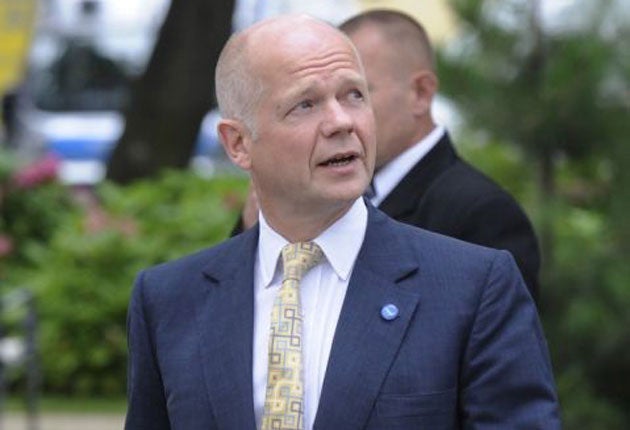EU oil ban denounced as too little, too late

Your support helps us to tell the story
From reproductive rights to climate change to Big Tech, The Independent is on the ground when the story is developing. Whether it's investigating the financials of Elon Musk's pro-Trump PAC or producing our latest documentary, 'The A Word', which shines a light on the American women fighting for reproductive rights, we know how important it is to parse out the facts from the messaging.
At such a critical moment in US history, we need reporters on the ground. Your donation allows us to keep sending journalists to speak to both sides of the story.
The Independent is trusted by Americans across the entire political spectrum. And unlike many other quality news outlets, we choose not to lock Americans out of our reporting and analysis with paywalls. We believe quality journalism should be available to everyone, paid for by those who can afford it.
Your support makes all the difference.The European Union imposed a blanket ban on Syrian oil imports yesterday, but immediately faced accusations that its embargo would allow oil companies to fund the Assad regime into the New Year.
After troops reportedly killed up to 13 pro-democracy demonstrators who chanted "death rather than humiliation" after Friday prayers yesterday, EU foreign ministers agreed to a ban on Syrian oil imports that total more than $3bn a year. The ban is designed to cut off one of the regime's main sources of income in the hope that it will halt its lethal crackdown on protesters.
Speaking after a meeting of EU ministers in Poland, the Foreign Secretary, William Hague, said: "The EU has made clear that we will increase the pressure on President Assad until he steps aside and allows a transition to a different type of regime. Throughout Ramadan we have witnessed horrific scenes of continued brutality.
"This is unacceptable and today we have agreed a ban on all EU imports of Syrian crude oil products to constrict the regime's funding and reduce its ability to fund the repression of innocent civilians."
Pressure groups jumped on the detail of the agreement however, which includes an Italian amendment that allows companies to continue to trade with Syria under existing contracts until 15 November. Because oil industry agreements usually allow for 30- or 60-day payment periods, European oil firms could well be funding the Assad administration into 2012. The EU buys as much 95 per cent of Syria's oil. France, Germany and Italy are the biggest buyers. Ricken Patel, executive director of the campaign group Avaaz, said: "Diplomats, experts and citizens are baffled by Italy's senseless obstruction of oil sanctions. EU countries need to stand firm and shower President Assad's best friend in Europe with shame until the Italians back immediate sanctions."
The EU also banned European banks from opening credit lines for oil sales, and prohibited insurance companies from insuring the cargos. In addition to the embargo, four more Syrian individuals and three entities were added to a list of those facing an EU asset freeze and travel ban. The United Nations said at least 2,200 people had been killed since the uprising began in March. It has been impossible to verify claims on either side since Syria has banned the international media from the country.
It is understood that diplomats in Europe and the US, while publicly calling for the Damascus government to be ousted, are concerned that the opposition is not unified and would not be able to form a government to replace it.
European oil companies have backed the Assad regime to survive the uprising and have continued to buy Syrian crude oil and sell refined products. One such company, Vitol, was reported earlier this week to have supplied Libya's rebels with fuel.
Sources close to Royal Dutch Shell denied a Reuters report on Thursday that one of its tankers, the Neverland Star, was preparing to dock in the Syrian port of Banias over the weekend, but did not rule out trading with Syria in the future, if permitted to do so by international law.
Mark Eadie, head of corporate affairs at energy and commodities trader Trafigura, refused to comment on reports that it is expected to deliver a cargo of gasoline to the country in the coming days, saying the company "does not discuss current deals" Mr Eadie added that Trafigura complied with international law.
The French Foreign Minister, Alain Juppé, said yesterday that France was trying to develop stronger links with the Syrian opposition movement and that France is aiming to have a new UN Security Council resolution to "explicitly condemn the use of violence against the population and organise a sanctions regime."
Join our commenting forum
Join thought-provoking conversations, follow other Independent readers and see their replies
Comments